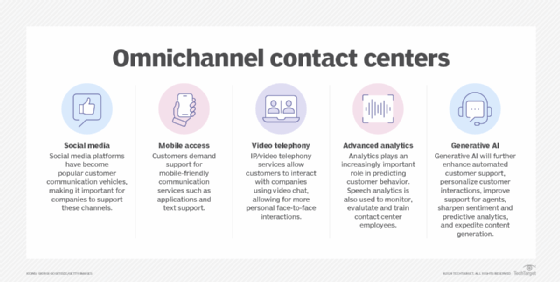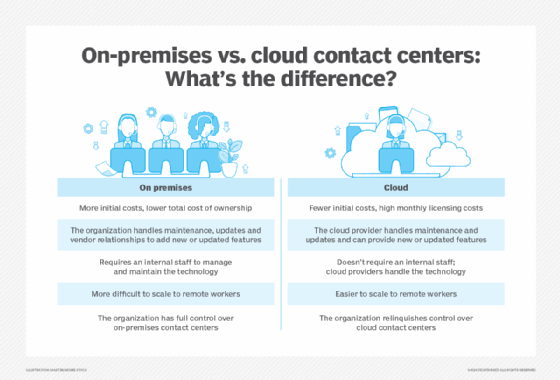What is contact center as a service (CCaaS)?
Contact center as a service (CCaaS) is a framework that combines contact center hosting principles and cloud-based contact center infrastructure. With CCaaS, organizations gain flexibility and agility. In addition, they pay less for assets with peak- and low-demand loads.
With CCaaS models, organizations purchase software subscriptions -- software as a service -- and rent hardware assets from a provider rather than own the assets themselves. In this approach, organizations enlist a pay-as-you-go model to get required resources as demand increases or decreases. Organizations opt to rent infrastructure or buy their own and have a CCaaS provider maintain it for them. Others combine owned and managed infrastructure -- often referred to as a hybrid model.
Cloud-based contact centers have grown in popularity. According to research firm Metrigy's "Customer Engagement Transformation: 2020-21" study of 700 global organizations, over 60% of organizations adopted single- or multi-tenant cloud-based contact center technology during the COVID-19 pandemic. Since then, there has been continued growth in the CCaaS market. According to The Business Research Company, the CCaaS market is predicted to grow to $6.7 billion in 2024 -- up from $5.65 billion just one year earlier.
How to implement CCaaS
To implement CCaaS, an organization must take the following steps:
- Identify business needs. The organization must first understand its specific needs and pain points -- such as call volumes and integration support, for example -- and then decide which CCaaS features are most important to it. This will help when choosing a vendor.
- Choose the right vendor. The organization should research and compare vendors to find the best fit in terms of features, budget, scalability, security and integration abilities.
- Configure the network. Before implementing the service, the organization should ensure it has a reliable internet connection, sufficient bandwidth and low latency. It should then configure workflows and integrate the service with existing systems. CCaaS can typically be configured with customer relationship management (CRM) and workforce management systems, for example.
- Train employees. Employees, supervisors and administrators should be trained on how to use the software. The organization should also create onboarding documents to help teach new employees how to use the system.
- Run tests. A pilot test should be run within a small group to identify any issues and to optimize the system for performance and customer satisfaction before a larger deployment.
- Deploy. The organization deploys the system and transitions to full use of CCaaS.
- Maintain. Once deployed, the organization monitors the system using key performance indicators (KPIs) to measure the success of the implementation, such as system performance, feedback and uptime, making adjustments and updates as needed.
Key features of CCaaS
Core features and functionalities of CCaaS typically include the following:
- Automatic call distribution. This feature -- also called skill-based routing -- routes incoming calls to available human agents or departments based on skills, workloads and other definable criteria.
- Contact center monitoring. This feature records calls in real time for quality assurance purposes and provides insights into customer interactions and agent performance.
- Reporting and dashboards. This feature shows detailed insights into contact center KPIs.
- Omnichannel communication. This feature manages multiple communication channels -- such as phone, email and text -- through an omnichannel platform, providing the customer with a seamless experience.
- Interactive voice response (IVR). This feature enables callers to interact, typically with a bot, using voice commands or keypad inputs. IVR is meant to direct callers to the appropriate location or to answer caller's questions.
- Workforce management. These are typically tools for optimizing agent productivity. They include features such as schedule optimization and traffic volume analytics.
- CRM integration. This feature connects the contact center with CRM systems, enabling call center agents to access customer data.
- Natural language processing. NLP enables automated systems to understand and process human language.
- Predictive dialer. This tool automates the dialing of numbers. Predictive dialers are often used to optimize outbound campaigns.

What are the benefits of CCaaS?
Benefits of a CCaaS model include those inherent to cloud deployment strategies and flexibility in contact center functionalities.
CCaaS offers organizations numerous benefits, including the following:
- Improved efficiency and productivity. Service providers manage assets, such as IT investments and hardware, so organizations don't need to allocate time and resources to manage and maintain them.
- Increased flexibility and scalability. Hosted contact centers can be scaled up or down to adjust to changing business requirements.
- Higher quality service. Organizations can use CCaaS to improve customer experience for end users by providing access to omnichannel communication options and functionalities such as artificial intelligence and voice recognition.
- Reduced risk of compliance issues. Built-in system redundancy ensures data is backed up, which can help ensure an organization maintains compliance.
- Ease of implementation. With cloud service providers, organizations don't need to implement and test new supporting software and servers.
- Cost savings. CCaaS negates the need for on-premises hardware and software and their associated maintenance costs.
CCaaS platforms and vendors
Organizations are increasingly adopting cloud platforms to implement contact centers. Although there are numerous vendors in the CCaaS market, Gartner notes the following nine market leaders in its 2023 Magic Quadrant for CCaaS:
- 8x8.
- Amazon Web Services.
- Content Guru.
- Cisco.
- Five9.
- Genesys.
- Nice.
- Talkdesk.
- Vonage.
What are the differences between UCaaS and CCaaS?
CCaaS and unified communications as a service (UCaaS) overlap in functionality. However, organizations use these platforms for different purposes, and different departments purchase them.
Organizations generally use CCaaS to communicate with customers; they use UCaaS for intra-organizational employee collaboration. CCaaS, which includes call center software, serves customer service with features such as automatic call distribution and IVR. CCaaS helps support and sales reps communicate with customers across various channels through a single cloud platform.
UCaaS is a cloud-based platform that contains an organization's enterprise communication apps. These apps include video conferencing, messaging, email and voice call functionalities. Other features include call-routing, conference bridging, virtual receptionist and voice-to-text conversion. The point of UCaaS is to streamline workflows and employee collaboration.
What are the differences between CCaaS and other contact center options?
CCaaS falls under cloud-based contact centers, which are one of several types of contact centers. Other types of contact centers include the following:
- Hardware. This type of contact center uses physical components that the organization sets up, hosts and maintains on premises.
- Hosted. The organization outsources infrastructure management to an external company.
- Virtual. This type of contact center enables contact center agents to work remotely.
- Hybrid. This type of contact center combines on-premises infrastructure with cloud-based software.
CCaaS has more in common with hosted and virtual contact centers, as organizations can outsource CCaaS, and its cloud-based infrastructure enables agents to work remotely. Hardware contact centers differ the most from CCaaS, although all types of contact centers serve the same purpose. Organizations must decide which contact center type works best for their individual business needs.

Are CCaaS deployments and cloud contact centers the same thing?
A cloud contact center is a type of hosted contact center. It typically refers to any contact center software delivered through cloud computing. The term is used as a broad concept and can refer to multiple types of cloud contact center deployment methods. Cloud contact centers commonly include core call center functionality like call routing and reporting, as well as routing of other omnichannel transactions, workforce optimization tools and chatbots.
Cloud contact centers typically encompass deployment models like CCaaS, private and hybrid cloud centers.
CCaaS software is fully managed by the provider, while cloud contact centers, depending on the deployment method, can be managed by the organization itself.
History and evolution of CCaaS
The origin of CCaaS dates back to the beginning of call centers. Call centers were, and are, completely phone-based, where customers call a toll-free number to interact with a representative from the organization. These calls were typically the only interactions customers had with organizations, and they were the only option to contact businesses.
After call centers came contact centers, which enabled customers to reach out to organizations in their preferred medium -- email, chatbot and social media, among other options. As organizations have continued to innovate and technologies like the cloud have grown in prominence, call center technology has also followed suit. CCaaS came from this continued innovation and organizations' desire to gain the benefits of cloud technology in their contact centers.
As technology continues to progress, CCaaS will follow suit. Experts have seen continued advancements in the growing relationship between UCaaS and CCaaS and the growth in cloud adoption due to the COVID-19 pandemic. Future CCaaS adoption can benefit organizations that haven't yet embraced it, providing benefits such as customer service improvements, lower costs and increased flexibility.
CCaaS is a growing contact center service option, as it offers a scalable, flexible and cost-effective way to manage customer interactions. Learn how to further improve contact center experiences for customers.







